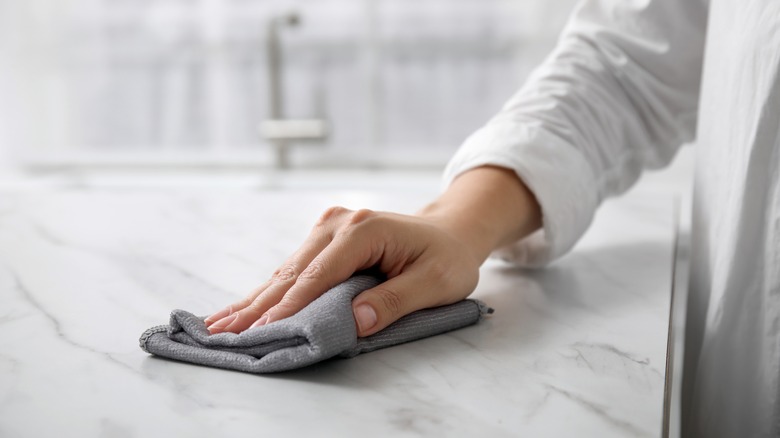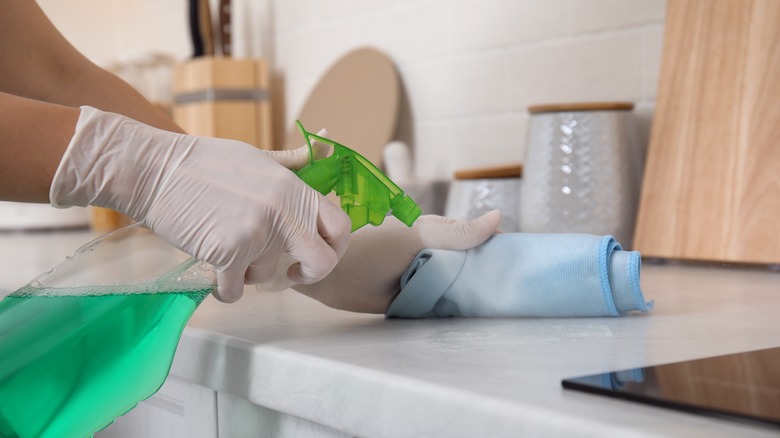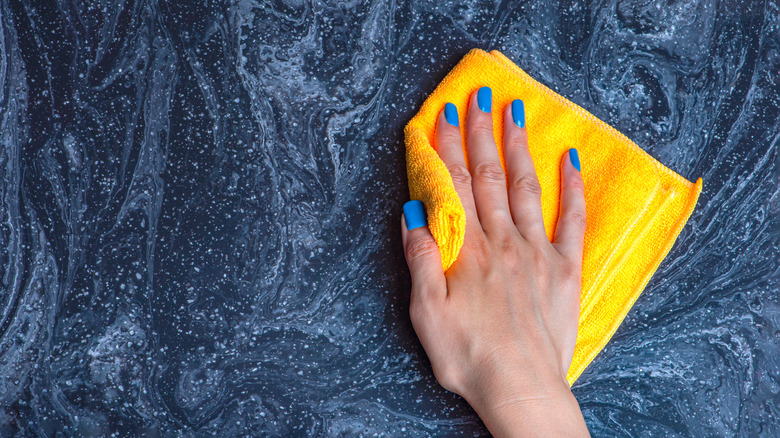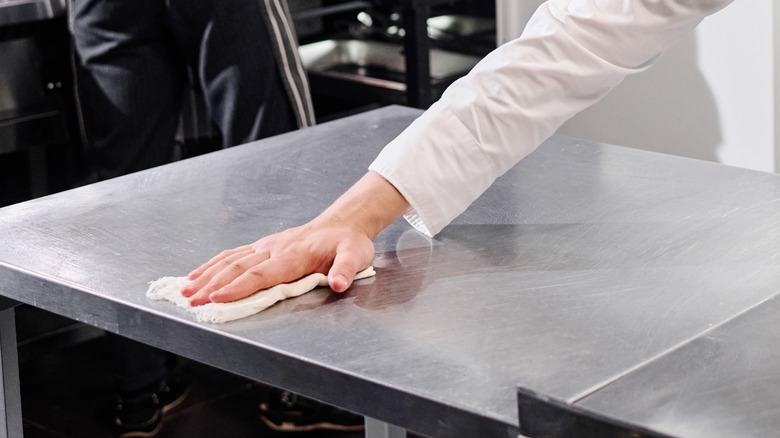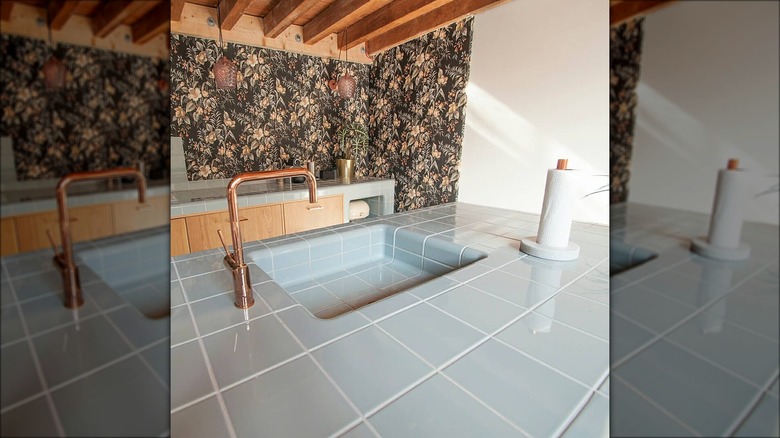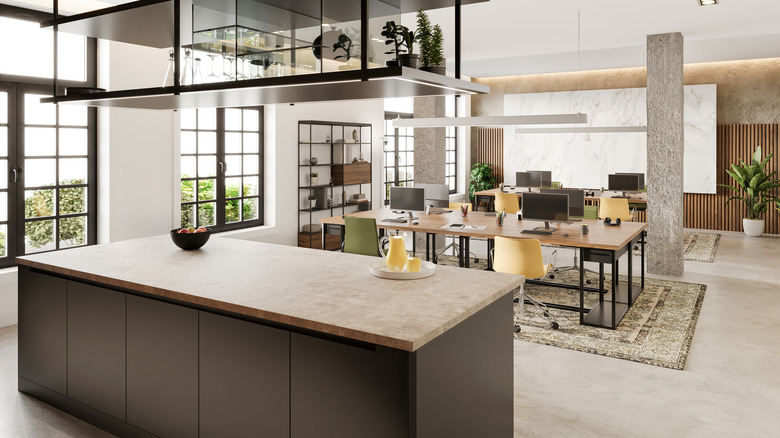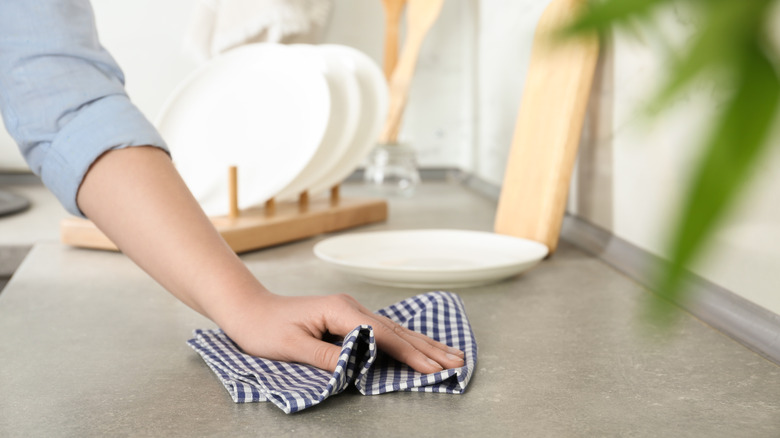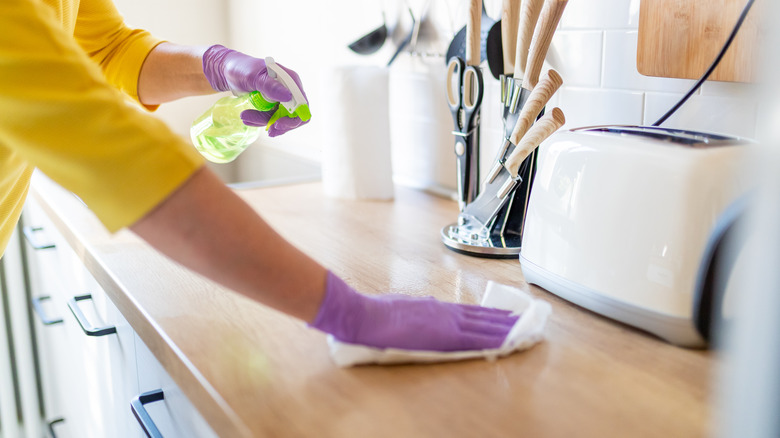The Countertop Materials That Are The Hardest To Keep Clean
When choosing countertops for your kitchen, there are several factors to consider. Durability, appearance, and how resistant the countertop material is against stains, scratches, and heat are all important things to keep in mind, but another important factor is how easy (or difficult) it will be to keep your chosen countertop material looking polished and stain-free. Not everyone can dedicate time to cleaning their countertops thoroughly every day, which makes it all the more vital to dig into the details of various countertop materials to see if they're suitable for a busy lifestyle.
Some materials do a great job at retaining their brand new appearance. However, others are tricky to keep looking clean over time, amongst them travertine, marble, stainless steel, concrete, wood, and laminate. You don't need to avoid of all of these materials completely, but instead take a closer look at them to see if they're right for you and your kitchen. Countertops are something you'll use daily, and messes are a part of kitchen life. Knowing which countertops would drive you crazy with fingerprint marks and which ones you could tolerate will make all the difference in how you feel about the new addition to your kitchen.
Travertine will show stains easily
If you haven't heard of it, travertine is a subsidiary of limestone that is naturally formed from springs. Its unique appearance, composed of swirls and various patterns, gives it an edge when it comes to design. It has a medium hardness, so it should hold up well against marks and scratches, and also isn't too expensive in comparison to other natural stone countertop materials such as marble or granite. However, because it is a porous material, travertine is prone to staining.
This means you might find it tricky to keep travertine looking brand new as time goes on. No matter how hard you try to prevent them, spills are bound to happen in the kitchen. Though many can be cleaned, more pigmented spills like red wine splashes could make a lasting impact. Because of this, we don't recommend using travertine in high traffic areas unless you're prepared for a few faint stains to be visible as time goes on.
Marble countertops are extremely high-maintenance
Marble countertops have gained a reputation for being priced at the higher end of popular countertop materials available. The gorgeously luxe appearance of marble makes it a popular choice for those looking to incorporate luxury into their kitchen. However, much like travertine, marble is porous. This means that it will stain incredibly easily and also makes it a very high-maintenance purchase that won't stay looking pristine for very long.
Not only does marble pick up stains, but if you end up with an acidic stain from something like a vinaigrette on your marble countertops, you'll probably have to live with that stain for as long as you have them. Marble is additionally prone to etching, which is when an acid reacts with the calcium carbonate found in marble and dulls the look of the stone. While there are certain methods that can clean stained marble, and you can seal your countertops to add some protection, we would only recommend choosing marble for your kitchen in a less-used area or if you're willing to put in the work to maintain them.
Stainless steel countertops are a magnet for fingerprints
Stainless steel is slightly different from the other materials mentioned on this list because it isn't porous. While it's durable, stainless steel does have some downsides, one of which is the fact fingerprints will be very visible. If you have pets, children, or you cook often, you'll know that fingerprints are an unavoidable occurrence in the kitchen unless you wear gloves all of the time. As well as fingerprints, stainless steel will show up every scratch and water mark, meaning it isn't a good pick if you hate the look of smudged countertops.
However, if your heart is set on stainless steel, you might want to try brushed stainless steel instead. This derivation of stainless steel comes with more character in the form of striations that will essentially hide fingerprints and all of the other marks that come with cooking (or at least make them less obvious). This style of the popular metal isn't widely available, but could definitely be something to consider if the sight of fingerprints is a major dealbreaker for you.
The grout used for tiled countertops won't make life easy
Tiled countertops, mainly made from ceramic or porcelain, may look pretty, but the grout is a major issue when it comes to a clean appearance. Speaking to Forbes, interior designer Audrey Scheck shared, "Although tiled countertops were popular in the 70s and '80s, I am hopeful that the realization that the grout lines are impossible to keep clean keeps this trend from ever coming back." Germs can enter the grout, not to mention mold and mildew can build-up and quickly make your gorgeous tiled countertops look less than desirable.
If you don't mind keeping the grout clean, the actual tile part of tiled counters is not difficult to keep clean due to them being relatively stain-resistant. You can also clean the grout, though you'll need to strike the balance between over-saturating the grout (which could lead to mold) and cleaning it. If you really want tiled countertops, you can seal the grout, too – it's best to do this after you have thoroughly cleaned all areas for best results.
Concrete countertops won't shake off stains well
Though a less popular countertop material, concrete has plenty of perks on its own merit, including being both heat-resistant and resistant against chips thanks to its hard surface. Despite this hardness, it will stain extremely easily. A seal will help, but it will need to be replaced regularly. Just like marble, concrete will hold onto pigmented stains due to its porous state. It can also gain small cracks as time goes on due to shrinkage.
Unless the seal on your countertops is airtight, a stain could very well become permanent, so we don't recommend it unless you want to spend your days being wary about having a glass of wine anywhere near your countertops. Concrete is on the pricier side too considering that you have to reseal it regularly. It isn't anywhere near the worst material, but, for the price and the fact it requires constant upkeep to remain stain-free, we don't recommend concrete countertops for a regular family home.
Laminate countertops are prone to discoloration
Laminate is a great affordable option if you love the look of marble but can't quite stretch your budget (not to mention that marble has its own issues). However, it comes with a host of possible issues. While stains can be cleaned with relative ease, what can't be gotten rid of as easily is discoloration. Generally, you can extend the life of your laminate countertops by wiping away any stains immediately, but you can't really do anything about discoloration.
In addition to discoloration, plastic laminate has very low resistance to heat. While this isn't much of an issue if you remember to put a mat down before a hot pan, it could be potentially disastrous if you forget. Moreover, if your countertops ever crack, there's nothing to do but replace them if the cracking starts to annoy you. As for cleaning, if you use harsh cleaners like bleach or even vinegar on laminate, you'll make the surface more vulnerable to marks over time. Laminate countertops may be cheaper than many other materials, but this cheapness comes at the cost of lesser durability.
Wood countertops hold onto stubborn marks
Wood countertops can look beautiful in traditional and modern kitchens alike, but, like most materials on this list, it will hold onto stains. Firstly, butcher block. Not only will this type of countertop scratch with not much pressure, but it also doesn't do very well with water, a huge issue for surfaces near your sink. As for stains, if you're unlucky enough to spill a pigmented liquid, you might find yourself having to re-sand and refinish your wood countertops so they don't look mismatched and uneven.
To prevent stains and scratches, you can (and should) seal your wood countertops, but this will require regular maintenance and may not protect the wood against all the above possible issues. In the same vein, bamboo won't hold up well against high temperatures and will absorb marks and stains quickly due to being porous. It also requires heaps of maintenance to keep looking good, including resealing. With the above in mind, you may find wood countertops more trouble than they're worth.
